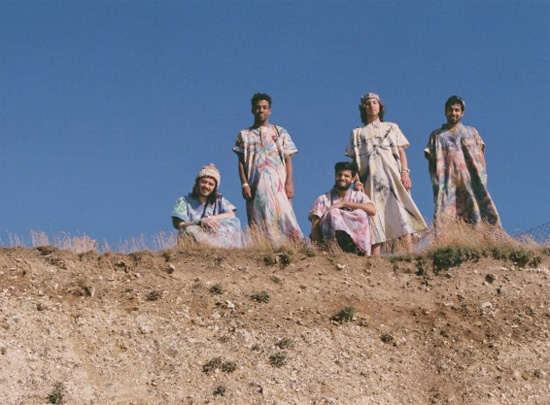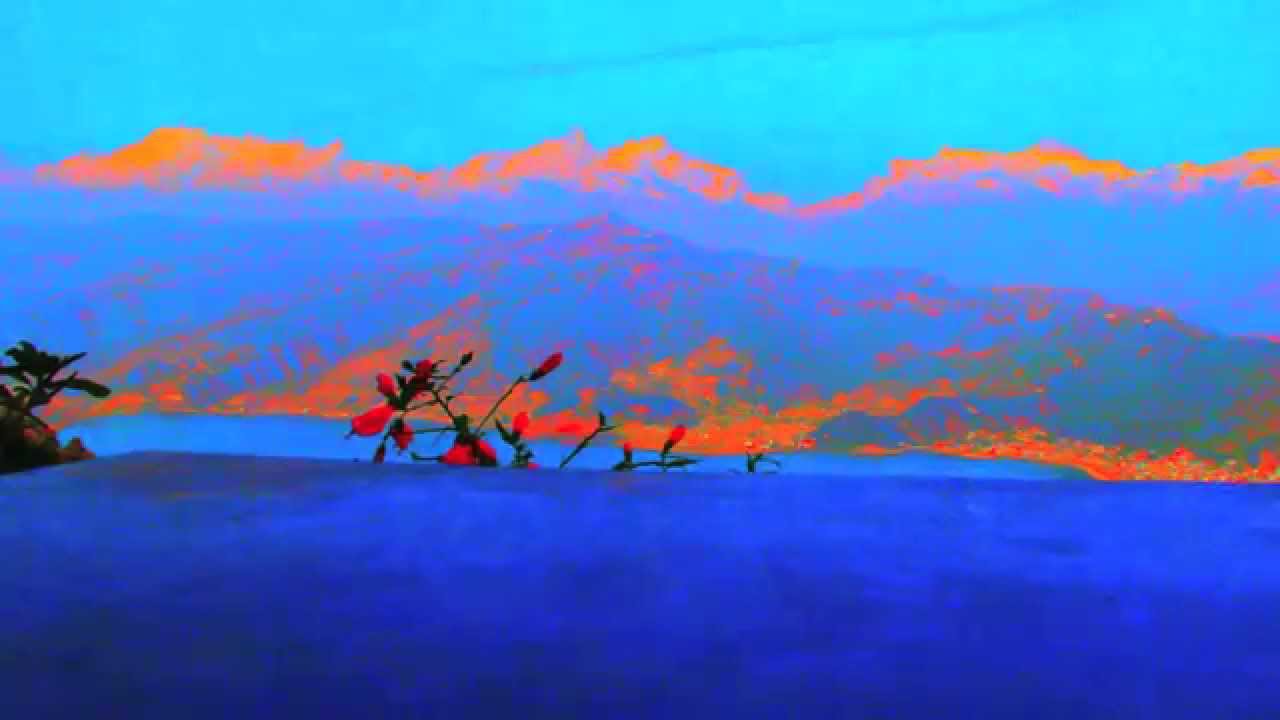"In a big way, we’re all culturally confused." Kamal Rasool is on the line from Dubai with his bandmate Charles Prest, reflecting on the sense of rootlessness that informs Flamingods’ new album Hyperborea. Released on Shape Records, the label founded by Welsh band Islet, it mixes its songwriting with chants, field recordings and dazzling clashes of multiethnic instrumentation.
Rasool founded Flamingods at home in Bahrain in 2009, originally as a solo project, recording on a variety of traditional instruments he’d collected while travelling. Flamingods became a group in 2010, following a weekend-long chalet jam at the Matt Groening-curated All Tomorrow’s Parties festival. Joining Rasool in the line-up were three of his Bahrain school friends, Craig Doporto, Charles Prest and Sam Rowe – by then all studying at university in the UK – and fifth member Karthik Poduval.
In 2012, while Flamingods’ first full album Sun was being recorded, changes in the UK’s visa laws meant that to stay in the country after graduation would require Rasool to quickly land a £20,000-plus job. Without success, he moved back to the Middle East. The fractured band then recorded Hyperborea by sharing audio files online.
What happened when you had to leave the UK?
Kamal Rasool: They changed the visa laws two months before I graduated. At first I moved back to Bahrain and worked on some songs at my parents’ place, then I got a job in a shop out in Dubai. We sell independent magazines and I’ve recently convinced them to start to stock vinyl. Stuff like that didn’t really exist out in the Middle East, so it’s exciting to be working on it.
Was this ever likely to split the band?
Charles Prest: Yeah, it was a weird one ’cause at first we didn’t think it would work. The four of us who were still here played a few shows here and there, just experimenting, trying new vocals and so forth, but we didn’t want Kamal to leave the band or anything like that.
How did you record Hyperborea?
KR: We’d made a few lo-fi albums before, where sometimes members were on songs and sometimes they weren’t. This was the first time we tried to make a full length album completely by sending files back and forth. We didn’t really have a choice and we had to resort to brainstorming ideas online.
CP: Everyone was literally all over the place. It was the only way we could do it.
KR: I think KP [Karthik] was in India for a while, and Charles was back in Bahrain for a tiny bit, so between us we had about five different bedrooms that we recorded in.
Did you discover unexpected benefits to working this way?
KR: Definitely, it made for a new, interesting dynamic. By sending files back and forth, the other band member would really have to think about them, do some research into what the person who put the initial stems down was trying to portray, and move it forward from there.
CP: It let us breathe a little bit more. Everyone was giving their own ideas from their own space instead of talking in the same room about what should be done. It was a lot more freeing in that way.
What were you listening to when you recorded the album?
CP: Mostly exotica and Bollywood funk. Both me and Kamal listen to so much Bollywood funk by Asha Bhosle and stuff like that. And Piero Umiliani, an amazing exotica composer.
KR: We’re always doing research and trying to find new music. We love to hear different sounds and find ways of putting these ideas into our music. I’ve been listening to a lot of mountain province Filipino music, which is kind of a dying art form, and the chants are really, really beautiful.
Have you ever travelled there?
KR: No, but we want to. There’s such a large Filipino population in Dubai. I’ve fallen in love with their food.
CP: The food’s amazing.
KR: We have a few friends who say they’ll take us to the Philippines and out to the mountain provinces for some gigs. That would be nuts. We’re also going to be touring the Middle East as much as we can next year, because we’ve got a few offers to play in places like the Lebanon and Bahrain. We’re preferably going to get the whole band over, and if not do it as a duo set with me and Charles.
How do you manage to fit in so much travelling and touring with your day jobs?
KR: I’m lucky enough to have a job where my boss lets me have two months every year to tour. Then I was a bit cheeky and managed to get a week off to go to Nepal (where the video for Hyperborea‘s title track was filmed) just because it’s so close to Dubai and it didn’t cost much to get there. Charles actually lives out here now as well, we both work at the magazine shop. It’s pretty cool.
Have you found opportunities to record other musicians on your travels?
KR: Oh man, that’s something that we’ve wanted to do for such a long time. We’ve seen so much live music out in these places, we saw some amazing bands in Nepal, but we’ve never got it down to recording it. I’m in talks with a few people about starting a new record label out here dedicated to that kind of thing so hopefully we can get a move on and start filming all the amazing stuff. Even out here in Dubai, a lot of people don’t realise there’s so many different ethnic minorities that live in the older part of town. For example, there’s a Nepalese bar that we’re completely obsessed with going to because the band is so amazing. We’ve wanted to record them for so long.
Where do the dialogue and field recordings on Hyperborea come from? Do you record it yourselves?
KR: Actually a lot of it’s from YouTube. It’s finding random stuff, like videos that have had less than a hundred clicks, and then trying to sample it. In the song ‘Trek Mountainous Heck’ we sampled this amazing video of two guys in Brazil going fishing for piranha. It’s this really sunny landscape and the sun’s in their eyes and they’re just laughing while this is going on. We can’t find it anywhere now though, it’s really upsetting.
How do you approach playing the instruments you’ve collected?
KR: We don’t play them in the traditional respect, not as a form of disrespect but rather because we’re interested in playing them in ways that haven’t been explored yet. Pushing them to the limit is something we’re really into. Everyone plays guitar, but to be good and original on a guitar in this day and age is a triumph. So, for example, on this album we played the Turkish qanun (a large zither). I’m half Turkish and picked it up when visiting family.
CP: Yeah, that qanun was pretty much all I used. I’m sure I wasn’t playing it in the way I was meant to but the sound I got interested me. I played it in the most brutal way to make something else out of it that wouldn’t necessarily have been traditional.
That’s quite a punk approach to an instrument.
KR: Exactly. I think we’re very much a punk band without being labelled as one.
Do you feel unrestricted by national identity?
CP: Yeah. Like nomads.
KR: We definitely are. We’ve never found one culture we can put ourselves into.
Have you always felt this way?
CP: Yeah, even growing up in Bahrain. The place is weird in itself. There’s a mix of culture there, and we took bits and pieces from all these different people we met. I’ve never felt that Bahrain was completely my home but then I’m from Jamaica and stuff, and I don’t really consider that my home either.
KR: We latch on to all these different interests and cultures and that seeps into our music. More than anything we’re just so fascinated by the world and all the strange and beautiful things that encapsulate it.
The single ‘Hyperborea’ is out now, and the full album Hyperborea is out in July on Shape Records.
Flamingods tour Europe throughout July and August. Their tour dates run as follows:
JULY
04 – De Nieuwe Anita, Amsterdam
05 – Roodkapje, Rotterdam
11 – 60 Million Postcards, Bournemouth
22 – July, Arci Virgilio, Mantova, Italy
23 – Pescara, Italy
24 – Radar Festival, Italy
27 – Milhoes de Fest, Portugal
AUGUST
01 – Knee Deep Festival
06 – Nation of Shopkeepers, Leeds
07 – Sticky Mikes, Brighton
08 – Lexington, London
09 – Supernormal Festival, Oxfordshire
13 – Birdcage, Bristol
14 – Oakford Social, Reading
20 – Kraak Gallery, Manchester
21 – 13th Note, Glasgow
22 – Doune The Rabbit Hole Festival
28 – Four Bars, Cardiff
30 – Raw Power Festival, London



